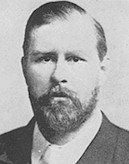|
 |
Abraham
"Bram" Stoker was born near Dublin on November 8, 1847, the
third of seven children. An unidentified illness kept him virtually
bedridden until age seven. Was the ailment of physical or psychological
origin? Was it responsible for Stoker's periodic lapses into morbidity?
As with so much of Stoker's life, the truth of this matter remains
shrouded in mystery. Young Bram had always dreamed of becoming a writer,
but his father had safer plans. Yielding to the elder's wishes, he
followed his father into a career as a civil servant in Dublin Castle.
Year 1890 marks the beginning of Stoker's research for his masterwork, Dracula,
which, seen years later, would launch its bloodthirsty protagonist,
Count Dracula (if not the author himself), on a course toward world-wide
acclaim. |
|
|
Click
on the cover to download your book / Haz clic en la tapa
del libro para
descargarlo. |
|
 |
DRACULA
Fiction
Bram Stoker began his notes for the story in 1890, a
full seven years before publication. He chose Whitby as his English
location, a popular shipping port, and supposedly a favorite vacation site
of his. A ruined cathedral overlooking the ocean there served as the
inspiration for the pivotal location of Carfax Abby. As for the choice of
Transylvania and the name Dracula, both came much later, almost as an
afterthought before publication. As Stoker researched the vampire myth, he
was drawn inextricably to the cradle of the vampire myth in Europe, the
Balkans. Prince Vlad Tepes (nicknamed "Dracula", Hungarian for
"Son of the Dragon") features quite prominently in Balkan
history, both for his role as defender of the Christian faith against the
Turks, and for his legendary cruelty.
CLICK
HERE if you need an Intermediate Level version of this novel. |
|
All
contents is for educational and informational use only. All books remain the right of the original copyright holder, and no infringment is
here intended / Todo
el contenido es pura y exclusivamente para uso educativo e informativo. Todos
los libros continúan permaneciendo al poseedor original de los derechos autorales, no existiendo aquí intención alguna de infringir la ley. |
|